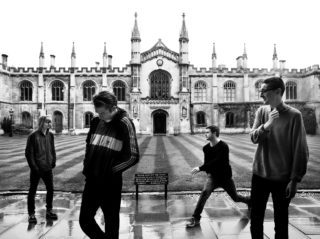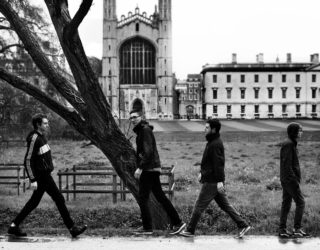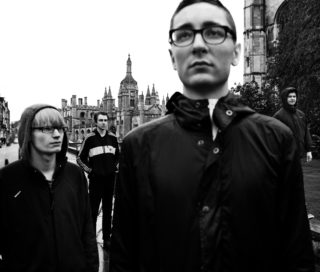Alt-J in Cambridge
We went to Cambridge to spend the day punting with Alt-J

We went to Cambridge to spend the day punting with Alt-J
Cambridge is possibly the most frustrating city in the world. Biscuit-tin-beautiful, it even looks good on Google Earth; a concentrated cluster of putting-green lawns and 16th Century buildings made for painting. It’s how, you imagine, Middle America might envisage England – a lush Arcadia, regal and historic, handsome and pompous. The thing is, Cambridge operates a strict look-don’t-touch policy. Those lawns and buildings, they’re the university’s, and ‘the gown’, it seems, doesn’t not like to share with ‘the town’. Cambridge is to visitors what Willy Wonka’s factory was to its victims. It’s one big tease.
Save for a small portion of the town centre, everywhere is off limits to those that don’t belong to one of the city’s prestigious colleges, and even if you do, you daren’t think about walking on the grass; it’s just not cricket. At every entrance there’s a tubby warden to shoo away the plebs, which today includes us and ∆ who relocated here eight months ago from another university town, Leeds. Today they’re showing us the sites of their new neighbourhood, which includes, in order, a famous bakery (slagged right off by our taxi driver on account of them dining out on the fact that Prince Charles bought a sausage roll there once), a pub where Pink Floyd played their first show, a punt on the River Cam, the pub again, some colleges we can’t get into and keyboardist Gus’ flat.
“We find Cambridge quite lonely,” says singer Joe Newman as the rest of the band echo the sentiment. As the guard at King’s College waggles her finger, we can see why.
“All the colleges have quite insular social scenes, so they go to their college bar and plays their friends are putting on,” explains Gus (Unger-Hamilton). “They’re doing college shit and it’s hard to get involved in that.”
“We’re not very proactive in penetrating that,” says Joe, before guitarist/bassist Gwil Sainsbury notes that Cambridge is so without a music scene that they’ve been to just one show (Portico Quartet) since living here.
“There is a band from here called Clean Bandit who are going to be massive,” says Gus. “I think they’ve moved to London now,” he laughs.
Of course, ∆ could have done the same having graduated and changed their name from Films to a delta sign. When we last interviewed them, in May 2011, they were still unsure of where they’d make their new start. They decided on Cambridge because it wasn’t London – a measured, pragmatic decision from a measured, pragmatic band. There are no tubby wardens in the centre of London, but there are plenty of distractions that most young musicians giddily hoover up.
“We could have moved to London after Leeds and got no work done,” says Gus. “And then what? A bit of hype would have gone to our heads, and god knows where we’d be now.”
“We just like the fact that we don’t need anyone else to function,” adds Joe. “We don’t need a scene to remind ourselves that we have similar tastes. We do what we do with our heads down.”
Isolation becomes ∆. Holed up in Brixton, south London, it’s where they recorded debut album ‘An Awesome Wave’; a record conceived within their own insular cosmos. It’s a fascinatingly complex album, as sophisticated and patient as ‘The xx’, as likely to take a turn for the weird as modern day Radiohead. The tracks rarely end as they begin, like ‘Fitzpleasure’, which travels through shamanic a cappella harmonies and dirty bass onto gobbledygook tongue twisters, intergalactic arpeggios and ascending group cries. Or the much sweeter ‘Something Good’, which is continually nagged by flourishing pianos. There are many fleeting moments, Joe says, “so that you’re always unfamiliar with the song”.
“I think the thing that most interests us is those decorative bits,” he explains. “Those little details are as important as the general structure of the song. You’ve got to keep the attention of the listener, and a good way of doing that is just by evolving the song and manipulating certain things that mutate and change.
“We try to make each new experience on a track as powerful as a hook. So if there’s a change in melody, or a drop in everyone playing, we should treat that moment, even though it’s fleeting and only happens once, like it’s a hook that happens over and over again. So we dedicate the same amount of time to those moments as we do to moments that repeat over and over again. Everything has to be of a high standard and to the same level – it doesn’t matter how many times we play it.”
There isn’t much that ‘An Awesome Wave’ sounds like. Having punted us down river with considerable ease, our puntsman (a friendly, posh chap called Ben who looks like an extra from The Wind In The Willows) nearly had a heart attack propelling us back upstream against the current. Once he’d got the colour back in his cheeks he asked Gwil what his band was called, then.
“Alt-J,” said Gwil.
“Old Jay? Cool. What do you sound like?”
“Every time the world caves in and I don’t know what to say,” says Gwil in the pub. “I always end up saying it’s folk meets electronica meets hip-hop. It sounds awful, like fusion music, some horrible hybrid.”
It’s a lot like trying to categorize TV On The Radio. Hopeless.

∆ began shortly after Joe had left his friends and travelled north to start university. It was to be his vanity project. Unveiling his until-then-private songs on Myspace, he thought, would prevent him from being forgotten and give everyone something to talk about on his return home. So he kept writing and recording, first alone and then with Gwil who knew his way around GarageBand. Gus became a fan and can still name more of Joe’s early songs than anyone else, while Thom says, “It was exactly the type of music I was looking for, I just didn’t know it until I heard it.”
They’ve since been through a few names, as bands tend to do, but Thom’s drumming has remained key to the group’s sound, unique due to the simple decision of axing cymbals, first because a kit with cymbals wouldn’t fit in the dorm room they practiced in, then because without the sounds of steel washing out the band’s songs, ∆ sounded like no one else. There’s no doubt that his sharp, cracking percussion provides them with a large portion of their hip-hop edge, the folk coming from Joe’s nasal soul vocal and Gus’ low harmonies.
The rest of the band hung around Leeds a year after graduating while Gwil finished his studies, and then they moved here.
“We had no money and we’d hatched this plan to move to Cambridge, which meant jumping through a lot of hoops,” recalls Gus. “There were five of us in all, living in a two-bedroom flat. We lived in constant fear that they’d come around for a surprise inspection and find Thom living in the hallway.”
Since signing a deal with Infectious, Joe and Thom are still housemates while Gus lives below Gwil, both with their girlfriends. Fearne Cotton has been love-struck since their second single, ‘Matilda’, and their tracks have been spotted on Match of The Day, Made In Chelsea and a channel called 100% Babes, which neither party confirms or denies knowing about.
Things are going well for ∆, no doubt because they’ve had a growing legion of fans since day one – surveyors of Soundcloud who’ve learned the words to the band’s demos and form triangles with their fingers at shows, à la Jay-Z’s Rock Nation diamond. I imagine, for a band who at first wanted to keep their faces out of photo shoots, the attention is taking some getting used to.
“It’s fucking weird,” says Gwil. “On the last night of the Ghostpoet tour we were in Wrexham and there were these girls with deltas on their faces. We met them afterwards because they were buying some merch and they were like, ‘do you want a joint while you’re loading out,’ so we’re like, ‘yeah, okay’. We’d loaded up the van and were waiting for our tour manager, and in that time we had to talk to them and we just got horrifically stoned, like, so we were paralysed. And they were taking photos and uploading them to twitter and asking us loads of questions…”
“It was horrible,” interjects Gus.
Gwil: “We were way too stoned to deal with them and they stayed there for over an hour and a half. I had to get our tour manager to sort us out but I was very high.”
“Ghostpoet’s band were calling us ‘Alt-Gay’, which didn’t help matters,” Gus laughs.
“We’re not very rock’n’roll,” says Joe.
I don’t know – we were drinking at 11am, albeit whilst on a punting tour of Cambridge.
“Yes, but only because our puntsman told us to,” says Gus. “It was peer pressure. He was like, ‘get the bruskis in, guys’, and we were like, ‘oh…okay…don’t make us’.”

To further prove Gus’ point, Gwil tells me of how his girlfriend’s father has some friends living in Cambridge so they – two dad-aged professors – came around for dinner, with Gus as moral support. Their guests insisted on listening to ‘An Awesome Wave’ and very much enjoyed it.
“I definitely used to think that if you make an album and your parents like it, it can’t be good,” says Gwil. “But now my parents really like our album and I think that’s a really good test, actually. It’s quite a young persons’ way of thinking, that.”
“We know that it’s going to be quite accessible for an older crowd,” says Joe. “People always love harmonies no matter how old you are. I think we have the best of both worlds. Generally, our music is quite odd to listen to, because you can’t compare it to too many things, or so we’ve been told. But also there are areas in the songs that are actually quite accessible to a wide range of people.”
It’s not as if ‘An Awesome Wave’ sounds like a James Morrison record though, just because your mum might like it. In class and execution, at least, it’s closer to Wild Beasts and The xx, swelling with plenty of emotion and natural musicianship for it to easily wash up on the Mercury Prize shortlist. Joe describes it as “disciplined”, saying, “If you put a microscope to every bit of it, it’s all been thought about very carefully; it’s very considered.”
“But it’s only something that can come easily when all of you are likeminded and so is your producer,” notes Gwil.
Joe: “…and it has to be said how crucial Charlie [Andrew, the band’s producer since they began] is to this record. There’s four of us but Charlie contributes just as much to our sound – he’s integral.”
The band’s most successful single to date is ‘Matilda’, an ode to Natalie Portman’s character in Leon that is arguably the album’s straightest song and the track that gives the folk to their ‘folk-meets-electronica-meets-hip-hop’ tagline. ‘An Awesome Wave’’s opening two tracks act as even more of a curveball to what follows, ‘Intro’ sleepily yawning into life to be met by an interlude (the a cappella ‘Rack And Ruin’, perhaps an old sea shanty, perhaps the sound of Sherwood Forest) as early as track two.
“The beginning of the album isn’t really representative of the rest of the record,” warns Gwil. “When we were in Berlin a guy there was like, ‘it’s weird that at the beginning of the album you’ve got two tracks that are pretty hard and then it’s hit after hit.’”
“The entrance exam,” says Gus.
“Exactly,” nods Gwil. “On that xx album, the intro was by far the most listened to track, by me, and that was the inspiration behind our intro. I think it’s best to confuse the audience at the beginning and freak them out. If they can get through that, they’re going to get through the rest of the album and love it.”